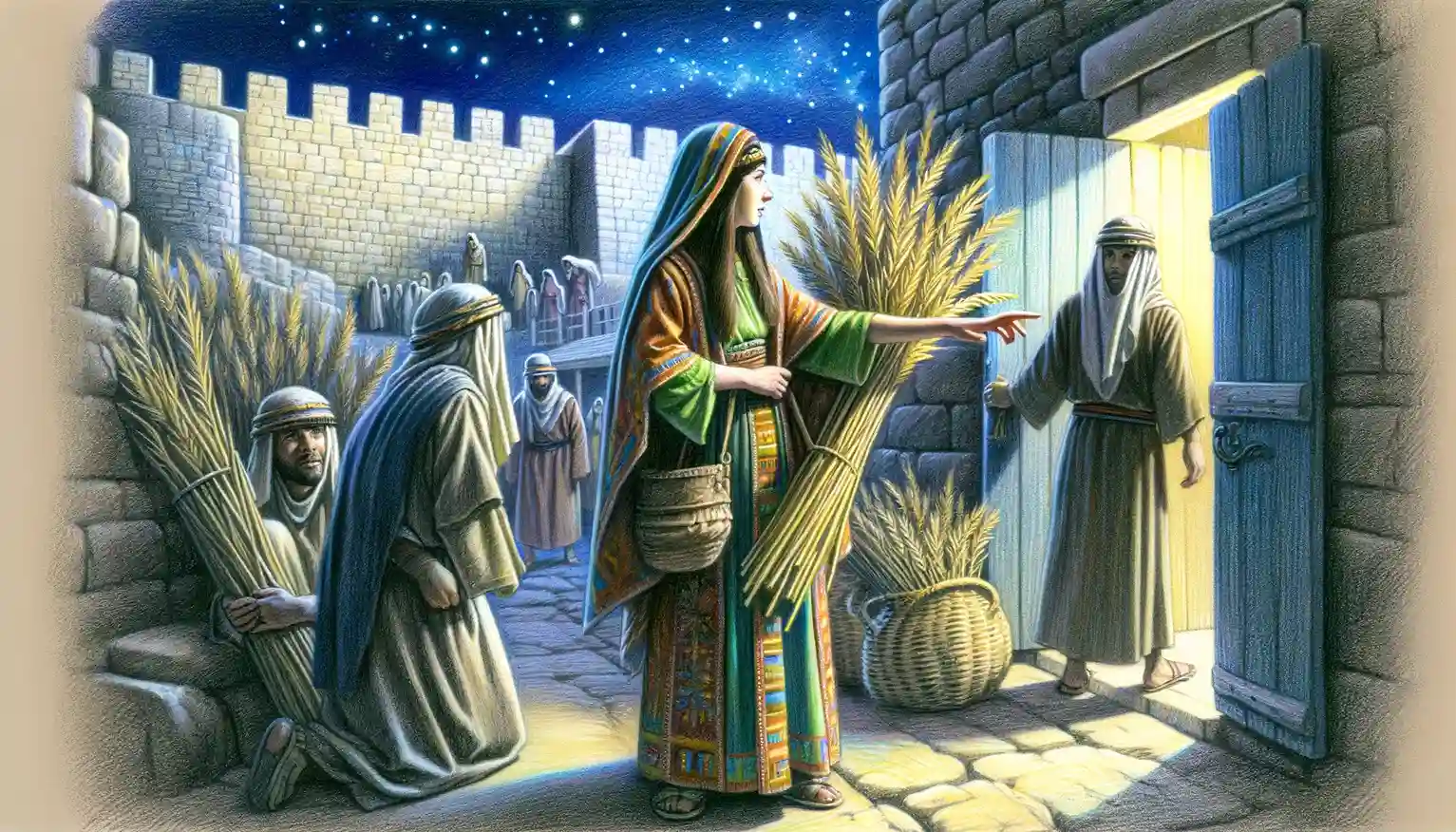
Rahab: Helped Israelite Spies in Jericho, Became an Ancestor of Jesus
Rahab, a notable figure in the Hebrew Bible, is celebrated for her bravery and faith. She helped Israelite spies in Jericho and later became an ancestor of Jesus, illustrating the power of redemption and God’s inclusive grace.
Quick Facts
- Occupation: Rahab was a prostitute living in Jericho.
- Helped Israelite Spies: She hid two Israelite spies sent by Joshua to scout Jericho.
- Faith in God: Rahab expressed her faith in the God of Israel, acknowledging His power and sovereignty.
- Scarlet Cord: She used a scarlet cord to signal her house, ensuring her family’s safety during Jericho’s conquest.
- Inclusion in Israel: After Jericho’s fall, Rahab and her family were spared and integrated into the Israelite community.
- Ancestry of Jesus: Rahab married Salmon, and they had a son named Boaz, making her an ancestor of King David and, consequently, Jesus (Matthew 1:5).
- Mentioned in Hebrews: Rahab is praised for her faith in Hebrews 11:31.
- Example of Redemption: Rahab’s story exemplifies God’s ability to redeem and use anyone for His purposes, regardless of their past.
Occupation and Context
Rahab was a prostitute living in Jericho, a city slated for destruction by the Israelites under Joshua’s leadership. Her profession and position in society made her an unlikely heroine, yet her story demonstrates the inclusivity of God’s grace and the transformative power of faith.
Helping the Israelite Spies
In Joshua 2, Rahab hid two Israelite spies sent to scout Jericho. When the king of Jericho’s men came looking for the spies, she hid them under flax on her roof and misdirected the search party (Joshua 2:4-6). Rahab’s actions were motivated by her belief in the God of Israel and her recognition of His power and sovereignty over the land (Joshua 2:9-11).
Expression of Faith
Rahab expressed her faith by declaring that she knew the Lord had given the land to the Israelites and that Jericho was destined for destruction. She acknowledged God’s supremacy, saying, “For the Lord your God is God in heaven above and on the earth below” (Joshua 2:11). This confession of faith was pivotal in her inclusion among the people of Israel.
Scarlet Cord
Rahab’s agreement with the spies included a pledge of protection for her and her family in exchange for her help. She used a scarlet cord to mark her house, ensuring it would be recognized and spared during the attack on Jericho (Joshua 2:17-21). The scarlet cord symbolizes both her act of faith and the salvation of her household.
Inclusion in Israel
After the fall of Jericho, Rahab and her family were spared and brought into the Israelite community (Joshua 6:25). This act of inclusion signifies God’s mercy and the breaking down of barriers between different peoples and backgrounds within His redemptive plan.
Ancestry of Jesus
Rahab married Salmon, a member of the tribe of Judah, and they had a son named Boaz. Boaz married Ruth, and their lineage led to King David, making Rahab an ancestor of Jesus (Matthew 1:5). This inclusion in the genealogy of Jesus highlights the unexpected and transformative nature of God’s grace.
Mentioned in Hebrews
Rahab is commended for her faith in Hebrews 11:31, where it says, “By faith the prostitute Rahab, because she welcomed the spies, was not killed with those who were disobedient.” Her faith and actions are celebrated as part of the great legacy of faith in the Scriptures.
Theological Themes
- Faith and Courage: Rahab’s story emphasizes the importance of faith and courage in the face of danger and uncertainty.
- Redemption and Inclusion: Her inclusion in the Israelite community and in the genealogy of Jesus underscores the themes of redemption and God’s inclusive grace.
- Divine Providence: Rahab’s story demonstrates God’s providence and ability to use unlikely individuals for His purposes.
Legacy and Impact
Rahab’s legacy is one of faith, courage, and redemption. Her story has inspired countless individuals to believe in the power of God’s grace to transform lives. She serves as a powerful example of how faith can lead to profound changes and inclusion in God’s redemptive plan.
Conclusion
Rahab, a prostitute in Jericho, demonstrated remarkable faith and courage by helping Israelite spies and expressing her belief in God. Her actions led to her family’s salvation and her inclusion in the lineage of Jesus, illustrating the transformative power of faith and God’s inclusive grace.



